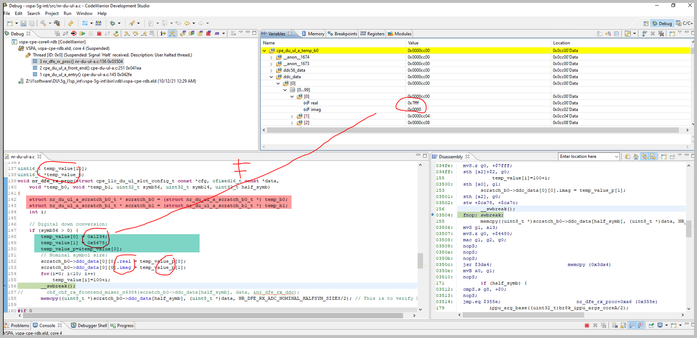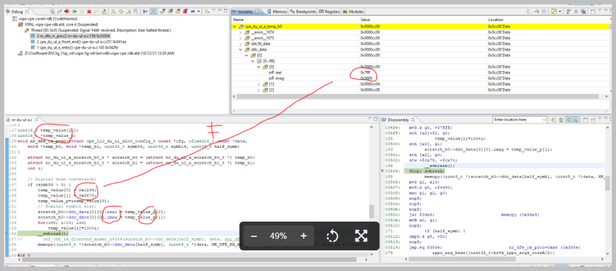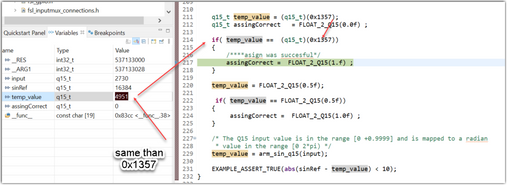- Forums
- Product Forums
- General Purpose MicrocontrollersGeneral Purpose Microcontrollers
- i.MX Forumsi.MX Forums
- QorIQ Processing PlatformsQorIQ Processing Platforms
- Identification and SecurityIdentification and Security
- Power ManagementPower Management
- Wireless ConnectivityWireless Connectivity
- RFID / NFCRFID / NFC
- Advanced AnalogAdvanced Analog
- MCX Microcontrollers
- S32G
- S32K
- S32V
- MPC5xxx
- Other NXP Products
- S12 / MagniV Microcontrollers
- Powertrain and Electrification Analog Drivers
- Sensors
- Vybrid Processors
- Digital Signal Controllers
- 8-bit Microcontrollers
- ColdFire/68K Microcontrollers and Processors
- PowerQUICC Processors
- OSBDM and TBDML
- S32M
- S32Z/E
-
- Solution Forums
- Software Forums
- MCUXpresso Software and ToolsMCUXpresso Software and Tools
- CodeWarriorCodeWarrior
- MQX Software SolutionsMQX Software Solutions
- Model-Based Design Toolbox (MBDT)Model-Based Design Toolbox (MBDT)
- FreeMASTER
- eIQ Machine Learning Software
- Embedded Software and Tools Clinic
- S32 SDK
- S32 Design Studio
- GUI Guider
- Zephyr Project
- Voice Technology
- Application Software Packs
- Secure Provisioning SDK (SPSDK)
- Processor Expert Software
- Generative AI & LLMs
-
- Topics
- Mobile Robotics - Drones and RoversMobile Robotics - Drones and Rovers
- NXP Training ContentNXP Training Content
- University ProgramsUniversity Programs
- Rapid IoT
- NXP Designs
- SafeAssure-Community
- OSS Security & Maintenance
- Using Our Community
-
- Cloud Lab Forums
-
- Knowledge Bases
- ARM Microcontrollers
- i.MX Processors
- Identification and Security
- Model-Based Design Toolbox (MBDT)
- QorIQ Processing Platforms
- S32 Automotive Processing Platform
- Wireless Connectivity
- CodeWarrior
- MCUXpresso Suite of Software and Tools
- MQX Software Solutions
- RFID / NFC
- Advanced Analog
-
- NXP Tech Blogs
- Home
- :
- CodeWarrior
- :
- CodeWarrior Development Tools
- :
- Why uint16_t assignment does not work
Why uint16_t assignment does not work
- Subscribe to RSS Feed
- Mark Topic as New
- Mark Topic as Read
- Float this Topic for Current User
- Bookmark
- Subscribe
- Mute
- Printer Friendly Page
Why uint16_t assignment does not work
- Mark as New
- Bookmark
- Subscribe
- Mute
- Subscribe to RSS Feed
- Permalink
- Report Inappropriate Content
Hi, experts,
I am trying to assign a 16-bit hex value to a uint16_t variable (actually an element of uint16_t array), but it does not work. I see the value is alway 0x7FFF for real and 0 for imaginary parts in CodeWarrior..
Any idea why? Did I miss anything? If I do the assignment for a floating point data, it works well. The value I see from CodeWarrior is just as I expected. But this uint16_t does not work the same way.....
- Mark as New
- Bookmark
- Subscribe
- Mute
- Subscribe to RSS Feed
- Permalink
- Report Inappropriate Content
Hi @xuedongyang
I hope that you are doing well!
From the below snapshot . In the green highlighted area , I think that everything is going ok.
But , as I understand , the assignation uint16_t real and uint16_t imag (members of your scratch_b0 structure ) is not as expected. Let me know if otherwise.
Could you let us see how the structures are defined (red area )? This to check and try to replicate the situation more effectively.
Does the compiler give you any warning on this?
I would recommend , to check if you need any cast , during the real and imag assignments.
Best regards,
Diego.
- Mark as New
- Bookmark
- Subscribe
- Mute
- Subscribe to RSS Feed
- Permalink
- Report Inappropriate Content
Thanks, Diego, for your help.
Please find the attached screen shot (capture1.png) for the structure definition. I think that the important thing is the definition of cfixed16_t. I am not sure which one (capture2.png and capture3.png) is the real definitions for cfixed16_t.
Maybe you can guide me if the definition is right and if the definition would cause the problem we observed.
BTW, I don't see any compiling warnings for this.
- Mark as New
- Bookmark
- Subscribe
- Mute
- Subscribe to RSS Feed
- Permalink
- Report Inappropriate Content
Hi @xuedongyang
Thank you for your reply!
Interesting! What if you go back to here , define temp value arrays as fixed16_t and test again?
Maybe the problem is an actual difference in the data type, as you mention with the fixed16_t . and the compiler can not see this. But during in assembly, the data is written to img and real in special way.
Diego.
- Mark as New
- Bookmark
- Subscribe
- Mute
- Subscribe to RSS Feed
- Permalink
- Report Inappropriate Content
Thanks for the advice.
I did an experiment for 4 types of data: float, uint16_t, uint32_t, and fixed16_t. All work as expected, except fixed16_t for assignment. See the attached screen shots.
Any idea why fixed16_t does not work?
- Mark as New
- Bookmark
- Subscribe
- Mute
- Subscribe to RSS Feed
- Permalink
- Report Inappropriate Content
Hi @xuedongyang
Thank you for your reply and interesting tests!
Probably , we still need to cast that assignation of the hex value to the fixed16_t , which is intended for fixed point arithmetic. I have a snippet code to test, where we check by code, and not by the IDE the assignation if the fixed16_t variable was successful.
/** cast asignation of data to the data type *//
fixed16_t a = (fixed16_t ) 0xFE ;
/** check assignation */
if ( a = ( (fixed16_t) (0xFE) ) )
{
/** assignation was the expected */
}
By the way, which NXP processor are you using?
All the best
Diego .
- Mark as New
- Bookmark
- Subscribe
- Mute
- Subscribe to RSS Feed
- Permalink
- Report Inappropriate Content
- Mark as New
- Bookmark
- Subscribe
- Mute
- Subscribe to RSS Feed
- Permalink
- Report Inappropriate Content
Thank you for your reply,
According to what I have found on that fixed16_t: its highest bit is the sign bit, and the remaining 15 bits are data .The data values from MSB to LSB are 2^(-1) to 2^(-15), for example, 0x4000 represents 2^(-1) and 0xC000 represents -2^(-1).
This seems to match the fractional q15_t data type on the ARM CMSIS DSP library. however with my project compiled on ARM GCC I have not found this problem during variable assignation.
I am in the general purpose MCU area, unfortunately , I do not have the hardware and SW libraries to test on my own. I would recommend check for any examples within your BSP drivers where this fixed16_t is implemented and test the assignation using different values than 0x1357, for example 0.5 and -0.5 . It could be that the 7FFF, you are seeing represents an overflow to the data type. Check that the sign bit can be set.
Please accept my apologies for the delay and the inconvenience.
Diego.


